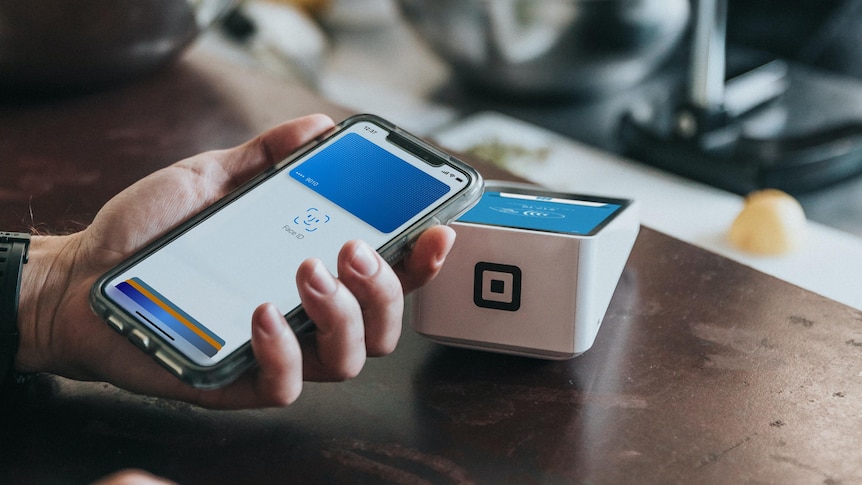Millions of Australians were impacted during the Optus outage this week, from not being able to buy coffee to landlines and some mobile phones failing to dial triple-0.
Restaurant owner Caron Zillwood was affected at both her home and business, with the EFTPOS machine at her steak and seafood shop out of action.
Despite Optus working to restore their service that day, it dropped out again on Thursday.
“It just shows the absolute difficulty of a cashless society,” she told ABC News.
Ms Zillwood says many of her regulars have been questioning Australia’s transition to a cashless society even before the Optus outage.
“A lot of our customers are older customers and they’re scared of the prospect of cash being removed from society.”
But experts say Australia’s transition to becoming completely cashless is well underway, and events such as the Optus outage won’t see cash return as king.
Australia among top users of digital payments
It’s no secret that digital transactions, from credit and debit cards to digital wallets like Apple Pay, dominate the payment landscape.
The Reserve Bank of Australia (RBA) found cash accounted for just 13 per cent of all payments made last year.
While the RBA has found tapping a physical card is still the most widely used payment method in Australia, contactless and digital payments are on the rise.
In fact, the Australian Banking Association found Australians are among the top users of digital payments, surpassing the US, Germany, the UK and France.
Angel Zhong, an associate professor of finance at RMIT, said the digital payment sector has “eclipsed traditional payment methods at an unprecedented pace over recent years”.
She said the COVID-19 pandemic only further accelerated this trend.
“A lot of business switched to digital payments or contactless payments only to curb the spread of the virus,” Dr Zhong told ABC News.
“While physical cash may still exist, it plays a significantly diminished role in day-to-day transactions compared to digital forms of payment.”
Richard Holden, an economics professor at UNSW, said Australia’s transition to becoming completely cashless is “well underway.”
“If you look at the volumes of cash transactions, they go down every year,” he told ABC News, predicting cash will become a rarity “over the next five years”.
“If the government wanted to accelerate that, if the Reserve Bank really wanted to make a push to make it literally, completely cashless, they could do that in a three-year time frame by simply saying ‘next year we’re going to retire the $100 and $50 notes, the year after we’ll retire the $20 and $10 notes’.
“That would give people a chance to transition.”
Optus outage raises questions around cashless transition
About 10 million Australians were affected during the Optus outage, with businesses emerging as one of the hardest hit groups.
One hospitality business told ABC News they lost 80 per cent of customers as a result of their EFTPOS machine being down due to the outage.
But experts agree the Optus outage was a rare event.
“I don’t think that the Optus outage will dramatically affect Australia’s transition towards a cashless economy,” Dr Zhong said.
“Widespread internet outages are rare and anomalous events,” she added.
Professor Holden agreed, saying, “it was very unusual”.
“We will never go back to cash, we will just move further and further away from it,” he added.
“It’s important to make sure it’s done in an inclusive way where older Australians don’t feel like that they are being excluded or that things are difficult for them.
“But the bottom line is [digital payments] are more convenient for almost all customers.”
He added that cashless payments are more convenient for retailers, from not having to handle cash, to counting it up at the end of the day, to paying for insurance for having meaningful amounts of cash on site.
“There are benefits for consumers and retailers of going cashless, and that’s frankly, the way that we’re headed,” Professor Holden said.
“And one of these days, whether it’s five years or 10 years or whenever, we will have a central bank digital currency. And at that point we, like every other advanced economy, will be 100 per cent fully cashless.”
Technological systems becoming more ‘resilient’
Dr Zhong says technological systems, including digital payment infrastructure, are “constantly evolving and becoming more resilient.”
“The recent outage serves as a reminder of the need for continued infrastructure investment in robust technology, back-up systems and contingency plans.”
Dr Zhong said that even in a cashless society, a diversity of payment choices, from mobile wallets to credit and debit cards, provides flexibility.
“While it’s important to acknowledge and address the short-term disruptions that may arise during the transition to a cashless economy, it’s crucial to keep in mind that there are substantial long-term benefits compared to these temporary challenges,” Dr Zhong says.
“The efficiency, cost savings, increased financial inclusion, and enhanced transparency that come with a cashless economy will ultimately lead to a more robust and resilient financial system for all stakeholders involved.”
Loading…
If you’re unable to load the form, you can access it here.

